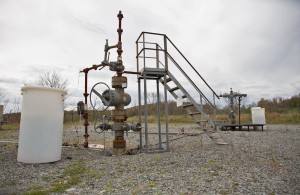Budget forces DEP to split regulations for shallow, deep wells
-
Katie Colaneri
Despite a new state law changing the way oil and gas wells are regulated, Pennsylvania’s Department of Environmental Protection is not going back to the drawing board on a proposed overhaul of the state’s drilling rules.
During July budget negotiations, state Republican leaders slipped controversial language into the fiscal code that requires state regulators to differentiate between “conventional” or shallow wells and modern, deep shale wells. Conventional wells have traditionally been subject to fewer regulations, although many are being developed today using horizontal drilling and hydraulic fracturing.
The change came just as the DEP wrapped up a series of public hearings and began wading through 25,000 comments on the draft rules. The new regulations would deal with surface activities on and around well sites – including waste handling, spill prevention, and protecting environmental resources.
“To start that process from scratch would be a disservice to that effort,” said Kurt Klapkowski, DEP’s director of oil and gas management.
At a meeting Thursday of the Oil and Gas Technical Advisory Board, the agency announced it would instead split the regulations into two parts: Chapter 78 for conventional wells and Chapter 78A for unconventional wells.
In many cases, the rules proposed by DEP already distinguished between both types of operations. However, the agency heard from conventional drillers that some statutes would be unnecessary or too expensive, including new requirements for security at well sites and electronic submission of some reports. The Pennsylvania Independent OIl and Gas Association, an industry trade group, also urged the legislature to legally clarify the definition of a “conventional well.”
Scott Perry, deputy secretary for oil and gas management, hopes the changes will not delay the process by more than a couple of months and said the agency plans to offer up the rules for another round of public comments.
The DEP must submit the final rules to the Independent Regulatory Review Commission by March 2016.
“If we miss that deadline, the rules will be withdrawn,” Perry said.

















